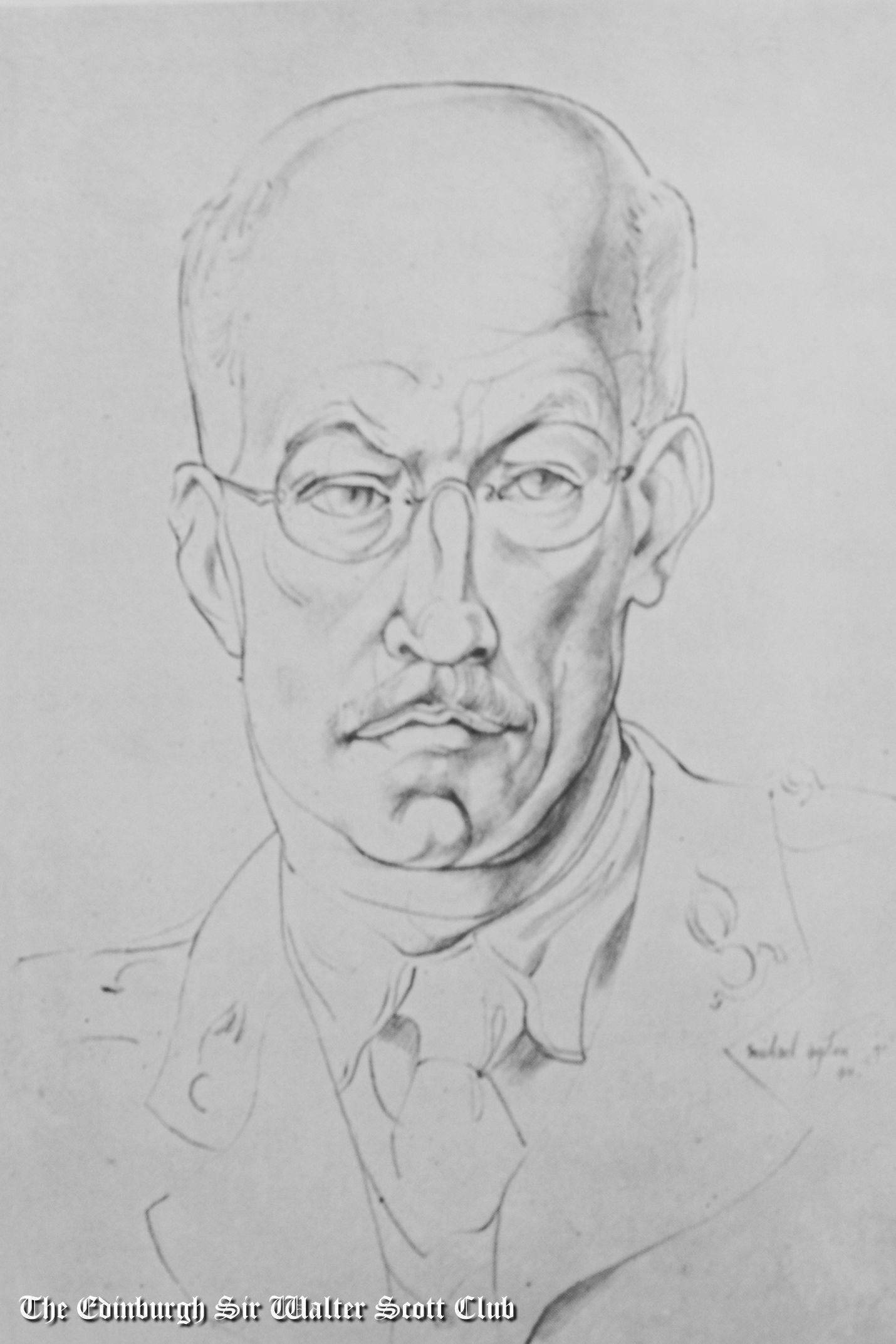1952
Our President in 1952/53 was:
Eric Linklater
He proposed the Toast to Sir Walter at our 45th Annual Dinner on Friday 20th February 1953 in The North British Station Hotel
Download the [transcript] or read the [bulletin]
Summary of the Speech:
Eric Linklater opens with a vivid image of George Square, Glasgow, where Sir Walter Scott’s statue towers above other figures from history and culture—often invisible in the fog, yet symbolically above all others. He uses this as a metaphor for Scott’s declining popular visibility but enduring greatness.
He critiques modern literary criticism, describing how it often shifts with fashion, side-lining once-revered figures like Scott. Yet he predicts that future critics, perhaps in “forty or fifty years,” will rediscover the enduring value of the Waverley novels.
Scott is judged by both literary and historical standards. While sometimes seen as unfashionable or flawed, Linklater argues that Scott belongs to the main stream of literature—the great “story-tellers” or makars, who create characters that are full of life, like Meg Merrilies, Dominie Sampson, and Bailie Nicol Jarvie.
A large portion of the toast is devoted to Waverley and the development of Scott’s art from his early love of Border ballads. Linklater emphasises Scott’s natural talent for narrative and characterisation, praising his depiction of figures like Fergus MacIvor and Evan Dhu, who embody courage, loyalty, and a distinct moral code.
Scott’s skill, he argues, lies not in psychoanalysis but in dramatic revelation—showing character through action. He contrasts Scott with authors like Proust and Kafka, asserting that Scott’s characters “live” and that his world, though romantic, is grounded in emotional truth and historical texture.
In the latter part of the toast, Linklater shifts to Scott's historical legacy. Scott, he says, “rescued” Scotland’s past, giving it dignity and mythic grandeur. He retells the story of how Scott revived the Scottish Crown Jewels and persuaded King George IV to appear in Highland dress in Edinburgh, helping to mend divisions between Highlanders, Lowlanders, and even Scots and English.
He concludes with the idea that Scott created a narrative identity for Scotland—its own Homeric epic—and shaped the country’s self-understanding with heroic equanimity and poetic grandeur.
Noteworthy Themes and Insights
- Statue Symbolism: The fog-shrouded statue in Glasgow is a metaphor for Scott’s current obscurity yet eternal supremacy in Scottish culture.
- Literary Context: Scott is compared favourably to Cervantes, Balzac, Dickens, and Henry James. His flaws are acknowledged, but his genius is seen in his ability to create vivid, living characters.
- Scott’s Characters: The speech celebrates Scott’s robust, articulate characters drawn from all ranks of Scottish life. Their vitality and clarity of moral voice are seen as his lasting strength.
- Ballads and Equanimity: Linklater suggests Scott learned his tone and values—particularly his characteristic equanimity—from the Border ballads.
- Scott as a National Figure: More than a novelist, Scott is presented as a cultural architect who united Scotland’s fractured identity and created a poetic narrative of national pride.
- Relevance Prediction: Linklater expresses faith that Scott’s literary reputation will recover with time, resisting the fashions of transient critical opinion.
Download the [transcript] or read the [bulletin]

Subsidiary Toasts*
The toasts of "The Queen" and "The Royal Family" were duly honoured.
Thereafter The Hon. Lord Hill Watson, M.C., proposed the toast of “The Imperial Forces,” to which Lieut.-General Sir Colin M. Barber, K.B.E., C.B., D.S.O., replied.
“The City of Edinburgh” was proposed by Mr Charles H. Derry, American Consul General; and replied to by Sir James Miller, The Rt. Hon. The Lord Provost of Edinburgh.
The health of the Chairman was proposed by Sir Compton Mackenzie.
*It is regretted that it has proved impracticable to reproduce the speeches other than that of the Chairman.


